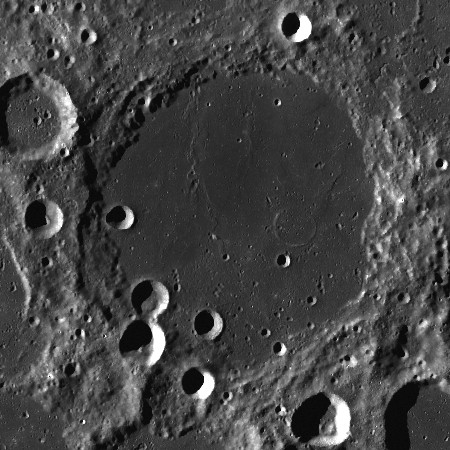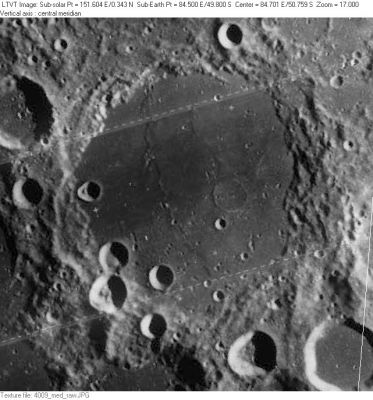Lyot
Contents
Lyot
(formerly Brisbane G)
|
Lat: 49.8°S, Long: 84.5°E, Diam: 132 km, Depth: 2.94 km, Rükl 76, pre-Nectarian |

Upper frame: Lunar Orbiter IV (LO-IV-009M). Lower frame: Lunar Reconnaissance Orbiter.
Note the ghost crater at the eastern sector of Lyot's floor.
Images
LPOD Photo Gallery Lunar Orbiter Images Apollo Images Kaguya Image, looking northward
- Lyot as seen by a Hasselblad camera of Apollo 15, and captured on color film: AS15-96-13093. In this photograph, the location of Lyot is about halfway between the frame's centre and upper left corner. See also the Hi-Res scan: AS15-96-13093 HR.
- Research: Danny Caes
Maps
(LAC zone 129A2) USGS Digital Atlas PDF
Description
Description: Wikipedia
Additional Information
Depth data from Kurt Fisher database
- Westfall, 2000: 2.94 km
Nomenclature
- Bernard Ferdinand Lyot (February 27, 1897 – April 2, 1952) was a French astronomer. He earned a reputation of being an expert of polarized and monochromatic light. Throughout the 1930's, he labored to perfect the coronagraph, which he invented to observe the corona without having to wait for a solar eclipse. In 1938, he showed a movie of the corona in action to the International Astronomical Union.
- Name originally proposed by Wilkins and Moore for Ptolemaeus A, but not approved by the IAU. The name was shifted to the present crater in the Rectified Lunar Atlas (1963) (Whitaker, 1999, p235). New nomenclature approved by IAU in 1964.
- Dorsum Lyot is an unofficial name from D.Caes for the wrinkle ridge on the floor of Lyot.
LPOD Articles
Bibliography
A Portfolio of Lunar Drawings (Harold Hill), page 240.
B. F. Lyot in the Sourcebook Project (William R. Corliss)
- In Mysterious Universe, a handbook of astronomical anomalies (1979) :
- Page 73: The Blunted Cusp Effect and Terminator Irregularities (at planet Mercury) (Dale P. Cruikshank, Strolling Astronomer, 1963).
- Page 119: A review of some ALPO Venus studies (Dale P. Cruikshank, Strolling Astronomer, 1963).
